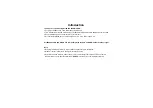
64
Your mobile device can also use
Assisted Global Positioning System
(AGPS), which
obtains information from the mobile network to improve GPS performance. AGPS uses
your wireless service provider's network and therefore airtime, data charges and/or
additional charges may apply in accordance with your service plan. Contact your wireless
service provider for details.
Your location
Location-based information includes information that can be used to determine the
approximate location of a mobile device. Mobile devices that are connected to a wireless
network transmit location-based information. Devices enabled with GPS or AGPS
technology also transmit location-based information. Additionally, if you use applications
that require location-based information (e.g. driving directions), such applications transmit
location-based information. This location-based information may be shared with third
parties, including your wireless service provider, applications providers, Motorola and
other third parties providing services.
Emergency calls
When you make an emergency call, the mobile network may activate the AGPS technology
in your mobile device to tell the emergency responders your approximate location.
AGPS has limitations and
might not work in your area
. Therefore:
•
Always tell the emergency responder your location to the best of your ability; and
•
Remain on the phone for as long as the emergency responder instructs you.
Navigation
Navigation
The following information is applicable to Motorola mobile devices that provide
navigation features.
When using navigation features, note that mapping information, directions and other
navigational data may contain inaccurate or incomplete data. In some countries, complete
information may not be available. Therefore, you should visually confirm that the
navigational instructions are consistent with what you see. All drivers should pay
attention to road conditions, closures, traffic and all other factors that may impact driving.
Always obey posted road signs.
Smart practices while driving
Driving safety
Check the laws and regulations on the use of mobile devices and their
accessories in the areas where you drive. Always obey them. The use of these
devices may be prohibited or restricted in certain areas, for example, hands-free
use only may be required. Go to
www.motorola.com/callsmart
(in English only) for more information.
Your mobile device lets you communicate by voice and data, almost anywhere, anytime,
wherever wireless service is available and safe conditions allow. When driving a car,
driving is your first responsibility. If you choose to use your mobile device while driving,
remember the following tips:
• Get to know your Motorola mobile device and its features such as speed dial,
redial and voice dial.
If available, these features help you to place your call without
taking your attention off the road.
• When available, use a hands-free device.
If possible, add an additional layer of
convenience to your mobile device with one of the many Motorola original hands-free
accessories available today.
• Position your mobile device within easy reach.
Be able to access your mobile
device without removing your eyes from the road. If you receive an incoming call at an
inconvenient time, if possible, let your voicemail answer it for you.
• Let the person you are speaking to know you are driving; if necessary,
suspend the call in heavy traffic or hazardous weather conditions.
Rain, sleet,
snow, ice and even heavy traffic can be hazardous.
• Do not take notes or look up phone numbers while driving.
Jotting down a "to
do" list or going through your address book takes attention away from your primary
responsibility—driving safely.
• Dial sensibly and assess the traffic; if possible, place calls when your car is
not moving or before pulling into traffic.
If you must make a call while moving, dial
only a few numbers, check the road and your mirrors, then continue.
• Do not engage in stressful or emotional conversations that may be
distracting.
Make people you are talking to aware you are driving and suspend
conversations that can divert your attention away from the road.
• Use your mobile device to call for help.
Dial 999 or another local emergency
number in the case of fire, traffic accident or medical emergencies (wherever wireless
phone service is available).
• Use your mobile device to help others in emergencies.
If you see a road
accident, crime in progress or other serious emergency where lives are in danger, call
999 or another local emergency number (wherever wireless phone service is available),
as you would want others to do for you.
• Call roadside assistance or a special non-emergency wireless assistance
number when necessary.
If you see a broken-down vehicle posing no serious










































